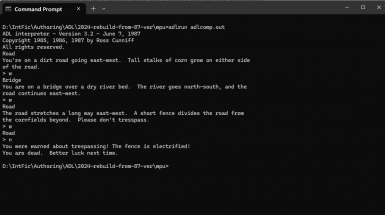Adventure Definition Language
| Adventure Definition Language | |
|---|---|
| Authoring system | |
| Links | Home page Download |
| Developers | Tim Brengle, Ross Cunniff |
| Format | Other |
| Interaction style | Parser |
| Systems | Windows, Linux, Commodore Amiga |
| System details | ADL generates an adventure file that you need to use the ADL interpreter to run (you can get it at the same sourceforge site). I have not tested if the output for windows ADL compiler will run on Amiga or Linux, or vice versa (unsure of the cross-platform compatibility of the game file, presumably the entire reason for it is for cross-platform support). |
| Latest version | 2020 Release (still 1.0) / 25 Sep 2020 |
| Status | Stable |
| Multimedia support | No multimedia |
| License | GNU GENERAL PUBLIC LICENSE, V2 (1992) |
| Browse the software database | |
| Edit this infobox | |
ADL, short for Adventure Definition Language, was developed initially in 1987 at Hewlett-Packard Company, in Cupertino, California, by two credited developers, Tim Brengle and Ross Cunniff. The documentation for 1987 ADL credits inspiration from DDL, Dungeon Definition Language, created in 1981 by Bruce Adler, Chris Kostanick, Michael Stein, Michael Urban, and Warren Usui, then members of the UCLA Computer Club (University of California at Los Angeles, CA). (Page Author) tried to find source code for DDL but came up empty. There is the DDL Manual on the ADL Sourceforge site, however.
Another ADL Resources information page has a nicely formatted ADL manual and link to Amiga disk image containing Amiga version of the ADL development system. It also has that 1987 version built and with installer (MSI) for Windows 11. This is probably the easiest way to start using ADL. Also this version of ADL is being maintained recently by Robert Szacki; the latest build was Summer 2024 as of this writing. I am not sure if it incorporates any of the 2020 code changes from the Sourceforge site, or not.
ADL's syntax is similar to UNIX Shell Scripts. It is procedural, like everything in the 1980's, but it does have the concept of "objects" more or less (a bit clunky to use, but objects can have routines and data properties). There is a standard.adl file that is the standard library anyone not wanting to build their own world model from scratch will want to use. Most of the example games break out the source code for their game as a "name-of-game.adl" main file, "objects.adl" for items, "locales.adl" for places, "verbs.adl" for new verbs or aliases for core or standard.adl verbs and behaviors, "routines.adl" for behavior overrides, etc. The example games are very simple, very deadly, very old-school adventure games. This is expected; they're all from 1987 or earlier.
Links
- programming/adl/ at the IF Archive.
| Authoring systems | |
|---|---|
| By style | Parser • Choice • Parser-choice hybrid |
| By system | Browser • Android • iOS • Linux • macOS • Windows |
| Browse | Stable authoring systems • Search form • Drilldown |
| Other software | Interpreters • Utilities |
